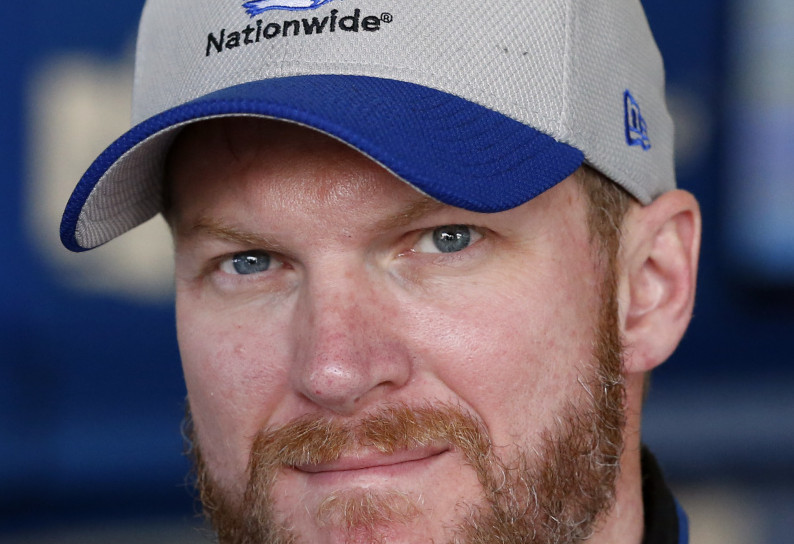Dale Earnhardt Jr., your work is done.
Long ago, you escaped the enormous shadow of your father.
Lately, you’ve ensured an important legacy all your own by raising a caution flag on head injuries in NASCAR.
Now, it’s time to seriously consider walking away.
For good.
Earnhardt is already sitting out the rest of 2016 to deal with the lingering effects of yet another concussion, but he made it clear that he hopes to be back behind the wheel next February for the season-opening Daytona 500.
“I have the passion and desire to drive,” Earnhardt said Sunday. “My heart is there to continue and if my doctor says I can continue, that’s an easier decision for me to make.”
There’s no doubt NASCAR will be rooting for his recovery, given the sport’s dwindling television ratings and ever-increasing number of empty seats at the tracks.
Earnhardt remains the sport’s most popular driver, and to have him walk away would be a huge blow given the reluctance of the fan base to embrace a new generation of stars.
But Junior can’t worry about any of that.
He’s got bigger issues to consider.
Earnhardt should give a hard look at all those former giants of the NFL whose brains were addled by one brutal hit after another, who died far too young or lived out their years in the cruel isolation of dementia.
No one knows for sure what another hard crash would do to Earnhardt’s brain.
He might be fine. He might not be.
“There are different levels of concussion. There are individual differences. The age the concussion occurs plays a part,” said Dr. Katherine Dec, a professor at the Virginia Commonwealth University School of Medicine who specializes in sports-related concussions.
“We’d all love to have an easy answer,” she added. “That’s what everyone wants to know, something that makes the decision kind of black and white. But the brain is a miraculous thing. There are still a lot of things we don’t know.”
We know that Earnhardt, at the very least, had two concussions about six weeks apart in 2012, which was the wakeup call everyone in NASCAR needed to address an issue that had long been swept under the rug. Junior sat out two races that year and sought out concussion experts to get the lowdown on potential problems down the road.
He became the most vocal advocate for brain safety, prompting NASCAR to mandate that all national series drivers undergo preseason neurocognitive baseline testing as part of a comprehensive concussion program. He also joined a growing list of athletes by saying he would donate his brain to science after his death so it can be studied for signs of chronic traumatic encephalopathy.
That will go down as Earnhardt’s most lasting impact on the sport, far more important than his two Daytona 500 victories or those other 24 career wins, or even the impressive feat of making a name for himself in a sport dominated by the towering presence of his late father, a seven-time Cup champion.
Junior certainly sent the right message again when he stepped out of the car after another hard crash at Michigan this summer. He actually managed to compete in the next three races before the concussion symptoms cropped up again. He’ll miss the final 18 events of 2016.
Dr. Raj K. Narayan, the head of neurosurgery at North Shore University Hospital in Manhasset, New York, and LIJ Medical Center in New Hyde Park, New York, said it’s impossible for those on the outside to know exactly what Earnhardt is going through.
But there are some common-sense aspects that should be taken into account when dealing with any head injury.
“The science has not gotten to the point yet where we can accurately qualify the amount of brain damage that already occurred, except to say that the more times you get injured and the more injuries you have, it makes total sense that it is likely to affect you more,” he said. “I think it’s quite clear that repeated, multiple injuries increase your risk of becoming demented with the passage of time.”
Of course, it was probably a lot easier for Earnhardt to make peace with sitting out the rest of the year than it would be for him to call it a career, given his potential – if healthy – to race at a high level for several more seasons. While Earnhardt has never won a season championship, he’s been a perennial contender.
Let’s just hope when Earnhardt sits down with his doctors, when he talks this over with his family and closest friends, he errs on the side of caution.
He’s already done so much for the sport. He’s certainly made his daddy proud.
He deserves to live a long, healthy life.
Copy the Story LinkSend questions/comments to the editors.



Success. Please wait for the page to reload. If the page does not reload within 5 seconds, please refresh the page.
Enter your email and password to access comments.
Hi, to comment on stories you must . This profile is in addition to your subscription and website login.
Already have a commenting profile? .
Invalid username/password.
Please check your email to confirm and complete your registration.
Only subscribers are eligible to post comments. Please subscribe or login first for digital access. Here’s why.
Use the form below to reset your password. When you've submitted your account email, we will send an email with a reset code.